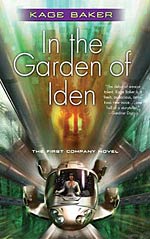
![]() dihenydd
dihenydd
2/18/2013
![]()
I need to add a Time Travel shelf I seem to be reading so many lately. this is really more of a 3.5 but I did enjoy it so much more than 'Blackout' by Connie Willis.
The premise is that in the not enormously distant future time travel and immortality are discovered/invented. Not necessarily in that order. This is all coordinated by the 'Company' whose head honcho is Dr Zeus (maybe). However immortality can only be conferred on the prepubescent and time can only be visited retrospectively.
In the 'now' the Company owns pretty much everything by the expedient measure of going way back in time recruiting/kidnapping kids, conferring immortality, instilling loyalty and getting them to stash away that which is going to be useful/valuable/extinct in the future. Where upon the Company miraculously finds these lost treasures in it's own time (in both meanings).
We follow the Mendoza a guileless child victim of the Spanish Inquisition as she is kidnapped, altered, trained etc into a New Model Company woman and then let loose in Tudor England to rescue plants that will otherwise become extinct in the future.
As you can tell from the book summary she falls in love and there are disastrous consequences. I wont spoil it any further than that.
I found the beginning a bit tedious while we were brought up to speed with the premise of the book. However I acknowledge that this was probably unavoidable since it sets the scene for a whole series of books. Her transition from filthy urchin to modern sterile prude who is scared to touch the presumable disease ridden locals is not without humour. the book really gets into its own though in the historical part. This was actually the most moving and interesting part (again comparing with Blackout where it was the most boring). The religious politics of the time are made more interesting by being observed and narrated by people more nearly our contemporaries who have none of the fervour and zeal evidenced historically.
The character who really stood out was Nicholas who was both so much of his Age and yet so ahead of it at the same time. I found it impossible not to both sympathise with him and his striving towards a personal integrity and the ignorance and superstition which was his undoing.
I'm not rushing to the next book but I will probably get to it one day.
I forgot to add that it is of course a Garden of Eden metaphor - loss of innocence, good and evil etc.